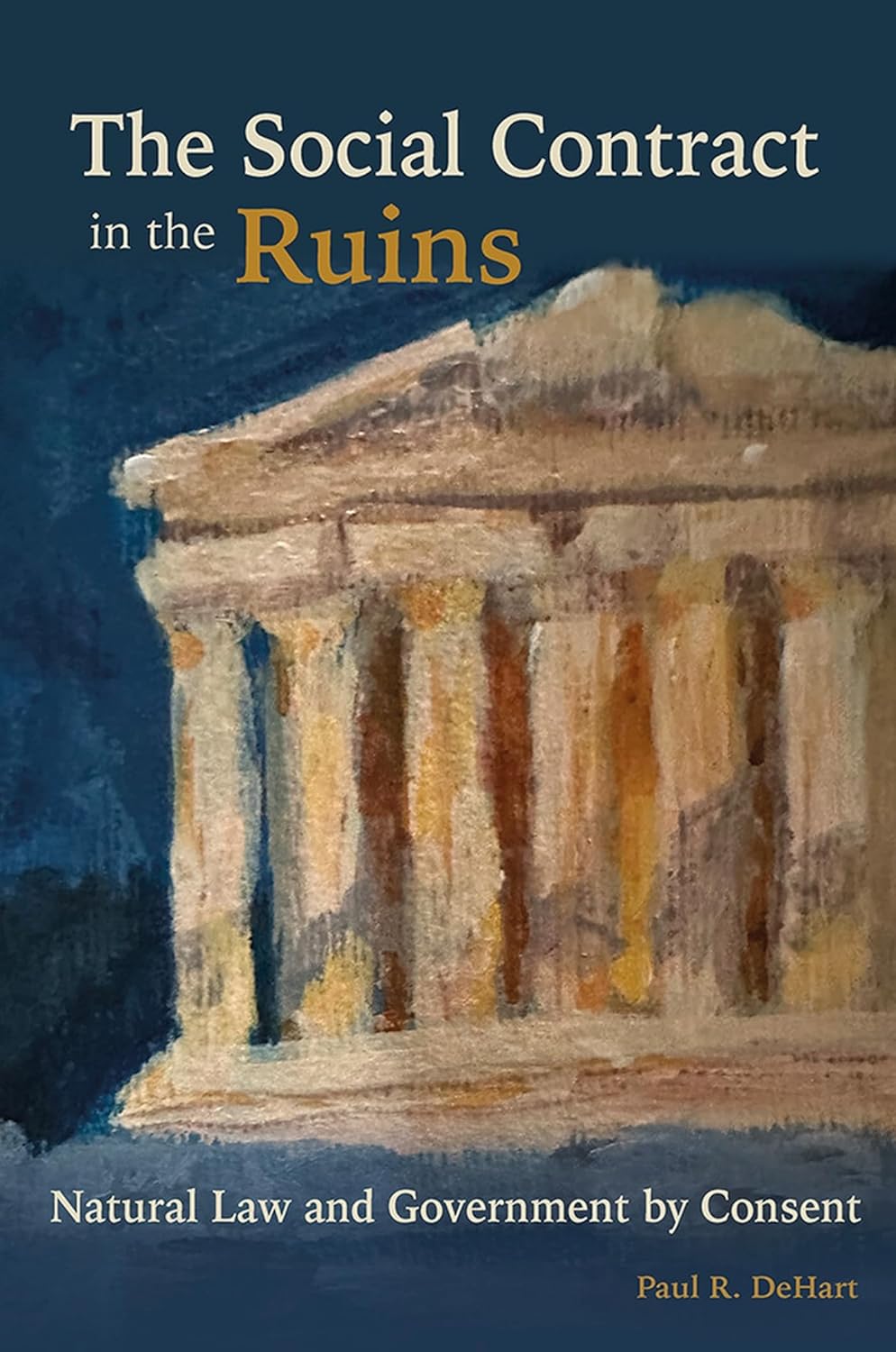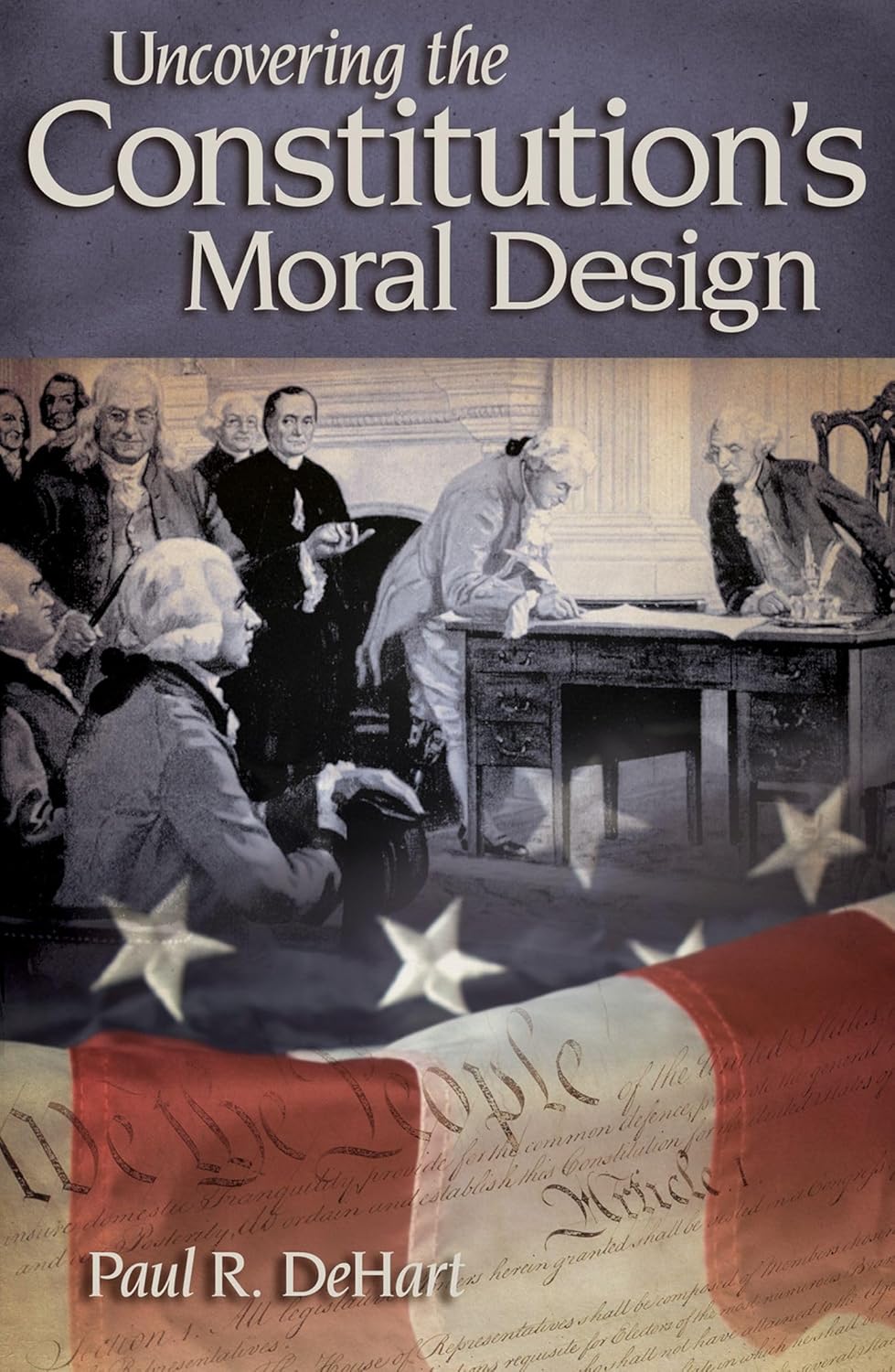
An interview with Paul R. DeHart
JMC Resident Historian Elliott Drago sat down with JMC Miller Fellow Scholar Paul R. DeHart to discuss his new book, The Social Contract in the Ruins: Natural Law and Government by Consent.
The necessity of consent and a real, uncreated good
ED: What inspired you to become a political scientist?
PD: When I first headed off to Houghton College (now Houghton University), in the Fall of 1994, I majored in political science because I thought I’d go to law school and end up practicing law—at least as a back-up career. I also signed up to study classical vocal performance—hoping, more than law school and becoming a lawyer, to have a shot at being a professional singer. In the first semester of my freshman year, I ended up in Ronald J. Oakerson’s Introduction to Politics course. He began the class by assigning Stephen Nathanson’s Should We Consent to be Governed?—a book that asks whether political authority can be justified and if so, on what basis.

Within about a month of the first semester of my first year at Houghton, I decided to pursue a doctorate in political science, with a focus in political theory (doubtless without understanding all that entailed). I also continued to study classical voice with the late Paul Giles, one of the founders of the Boston Lyric Theatre (and ended up considering voice my backup career). I eventually added a major in philosophy so that my work in political philosophy would be informed by training not only in political theory but also in philosophy. I was accepted into the doctoral program in Government at the University of Texas at Austin, while still wrapping up my undergraduate degree—and an honors thesis on how modern democracies both presuppose the self-interest of and require virtue from their citizens—in the Spring of 1998. I started doctoral work that Fall.
ED: What is the main argument of The Social Contract in the Ruins: Natural Law and Government by Consent?
PD: For the better part of the last century, the vast majority of scholars working in the area of political thought have held that social contract theory or consent theory—the principle that consent is necessary for political authority and obligations—and classical natural law are incompatible. They have held that the relation between classical natural law, on the one hand, and political contractarianism, on the other, is one of conflict rather than concord. Many scholars hold that political contractarianism, or government by consent, either instantiates the commitments of philosophical modernity (metaphysical nominalism—there are no real essences—subjectivism and relativism concerning good and evil, a voluntarist ontology of oughtness and obligation according to which these depend entirely on will and construction, anthropological individualism as a rejection of the traditional idea that we are social by nature) or attempts to adopt a kind of moral and metaphysical neutrality (agnosticism as to the nature of good and evil, justice, oughtness, human nature, the nature of reality, the nature of knowledge).
In either case, consent, in particular, and political authority and obligation, in general, are ultimately grounded in sheer will—whether the conventions or agreement of a community or of the sovereign or of divine omnipotence. In The Social Contract in the Ruins, I establish that any attempt to ground goodness, right, oughtness, normativity, or obligation in will—any attempt to make or construct these—is self-referentially incoherent.
Political authority and obligation, in general, and the principle of consent, in particular, require a real, objective, uncreated goodness.
PD: So where many scholars insist it’s either government by consent or classical natural law, I show that the former is necessarily and essentially dependent on the latter—that classical natural law is the only hope for a coherent theory of the consent of the governed. The relation between classical natural law and government by consent is not one of contradiction but, rather, of essential relation. And I show that the government by consent cannot coherently be grounded in philosophical modernity (as we find in Hobbes or, more recently, in David Gauthier) or moral and metaphysical neutrality (a la Rawls’s Kantian constructivism or Political Liberalism).
ED: What led you to write The Social Contract in the Ruins: Natural Law and Government by Consent?

PD: In the last year or two of my doctoral work, while wrapping up my dissertation, J. Budziszewski handed me an essay by Nicholas Wolterstorff and his response to it—from a conference in which they had both participated. Woltertorff’s paper focused on important criticisms of social contract theory—developing his own argument but also drawing on Leslie Green’s in The Authority of the State. At the time, I was in the midst of reverse engineering (and thereby excavating) the Constitution’s implicit normative frame (its moral ontology) and laying out the analytic argument that the Constitution’s institutional design presupposes classical natural law (in particular, moral and metaphysical realism) for its logical coherence (the book version of the argument published as Uncovering the Constitution’s Moral Design in 2007, with the University of Missouri Press).
PD: But even as I continued to work on that argument, I also found myself gripped by the question as to whether social contract theory and the principle of consent can provide a viable justification for political authority and obligation. The principle of consent stipulates that rightful political authority and genuine political obligations (in particular, the obligation to obey the law) require the consent of the governed. But—as John Simmons, Leslie Green, and Nick Wolterstorff argue—few people actually consent; certainly nowhere near a majority. And, as Simmons argues, that would seem to entail that governments have authority over few of the people they claim to govern and few people residing in a government’s territory have any obligation to obey it. Moreover, since consent theory seeks to apply the moral norms of promise-keeping (or keeping faith) to political foundations, hypothetical consent cannot substitute for actual consent. There is no moral obligation to keep promises I would have but did not actually make. As a line usually attributed to Robert Nozick goes, hypothetical contracts aren’t worth the paper they’re not written on.
The paucity of consent constitutes a theoretical and practical crisis for government by consent—for the contention that legitimate governments derive their just powers from the consent of the governed. We might call the paucity of consent social contract theory’s de facto problem.
PD: But I realized that social contract theory faces an even more damning de jure problem. For conventional social contract theory, of the sort we find in Hobbes and that is often attributed to Locke, weds the consent (or covenant and agreement) based justification of political authority and obligation to voluntarist metaethics—to the idea that right and wrong, just and just, obligation, oughtness are created by will (ours, the sovereign’s, God’s). And, shortly after finishing my dissertation, I developed the argument that voluntarist accounts of right and wrong, of ought and obligation (metaethical voluntarism, normative constructivism, normative positivism) are self-referentially incoherent. I wanted to know if these crises for government by consent could be resolved. After completing my dissertation and first book, I wrote a conference paper on the problem of consent. And then I applied for and received a Summer Stipend, in 2008, to begin researching this on project and a preliminary article. In one way or another, with various interruptions and other projects along the way, I’ve been working on this one since about 2007.
ED: Why do we need to read The Social Contract in the Ruins: Natural Law and Government by Consent?
PD: To borrow a bit of framing from Michael Oakeshott and Frank Oakley, we can identify two main traditions of moral and political (and, for that matter, theological) reflection with roots in ancient thought, that we also see in medieval reflection on natural law, and that persist into modernity (indeed, to the present day). One tradition, that goes back to Plato (left) and Aristotle and that pulses through the thoughts of Cicero, Augustine, and Aquinas, begins with goodness. In this tradition (call it the realist tradition), the ultimate ground of morality—of ought in general—is a real, uncreated goodness that transcends will and is normative for it. In this tradition, we may enter covenants or agreements and make things like laws and constitutions. But when we do, these are only right or legitimate insofar as they are grounded in and not contrary to the common good. I’m reminded here of the claim made by the Athenian Stranger in Plato’s Laws—namely, that so-called laws contrary to the good of the whole (that are instead for the advantage of some part of the community rather than the for common good) are “bogus laws” and those who say such so-called laws have a claim on our obedience is “wasting their breaths.”
The other tradition—also with roots in antiquity (Protagoras, Thrasymachus, Glaucon) and the Middle Ages (Ockham) but that reaches its apotheosis in modernity and, in particular, in the work of Thomas Hobbes—begins with will. On this view, all our norms—moral, political, legal—are created by acts of will. They might be created by God—for instance, in Chapter XXXI of Leviathan and Chapter XV of De Cive, Hobbes grounds the binding power of the laws of nature in divine omnipotence and irresistible power—or made by us—thus, in De Homine, Hobbes claims that ethics and politics, the sciences of just and unjust, are a priori demonstrative sciences
Will is ontologically prior to goodness.
PD: In both the realist and the voluntarist traditions, we find reason and goodness, on the one hand, and will and construction, on the other. The difference between these views has to do with their relationship. The realist tradition holds that real, uncreated goodness is the fundamental reality. The voluntarist tradition holds that it’s will. In The Social Contract in the Ruins, I demonstrate that the voluntarist tradition (Protagoras, Thrasymachus, Glaucon, Ockham, Hobbes, Hume, David Gauthier, John Rawls’s Kantian constructivism) is logically incoherent. The position that ethics and politics are products of will all the way down (ours or God’s) ultimately eliminates just and unjust, good and evil, obligation, and oughtness altogether. On the idea that all our norms are ones we make or are imposed on us by irresistible might—whether of a mortal god (i.e., the sovereign state) or an immortal one—nothing is coherently binding. To adapt a famous phrase of Locke’s for my own purpose, the taking away of a real, uncreated goodness ultimately dissolves all. So whether we’re talking about ethics, politics, or theology, the only logically coherent ground is a real, uncreated goodness. The possibility of a political order that is neither anarchy nor tyranny depends on it.
ED: Explain to us the most compelling link you found between political obligation and morality.
PD: Going back to my first article on natural justice in ancient political thought (“The Dangerous Life: Natural Justice and the Rightful Subversion of the State,” published in Polity in 2006) and then in Uncovering the Constitution’s Moral Design and “Covenantal Realism” (Perspectives on Political Science in 2012), I’ve been arguing that legal and political obligation depend, for their coherence, on moral obligation. Now, it’s important to understand what I’m (emphatically) not saying here. I’m not saying that if something is a moral obligation or something that we morally ought to do, that it is therefore, or must be a human law or enacted in positive law. That is, I’m not positing this conditional: If a moral obligation, then a legal obligation. Rather, my argument (along with Plato, Cicero, Augustine, Aquinas, Locke, James Otis, Alexander Hamilton, James Wilson) has been that moral obligation or moral good is a necessary—though not sufficient—condition of positive or human law (the very thing that Hans Kelsen endeavored—in convoluted and incoherent arguments and quite unsuccessfully—to deny). Standing by itself—without being grounded in a prior moral good or moral obligation—legal obligation ultimately rests on nothing other than will. But, in that case, legal obligation is really just an instance of metaethical voluntarism or normative constructivism—positions that are self-referentially incoherent. And the same goes for political obligation.
Free standing political obligation—ungrounded in a prior, real ought or good—instantiates a voluntaristic and therefore incoherent ontology of obligation. So legal and political obligation require a coherent, independent, moral ground.
PD: And contra David Gauthier, this moral ground cannot be something we make (or, for that matter, something that sheer omnipotence or irresistible power makes) from pre-moral or nonnormative ingredients. If you will, the moral ground on which political and legal obligation depend for their coherence cannot be a conventional or (moral) contractarian account of just and unjust, right and wrong—for that position, too, is self-referentially incoherent. Political and legal obligations require a moral ground, a real good, that transcends mere will and is normative for it. In The Social Contract in the Ruins, I aim to elaborate this argument pretty fully and systematically, by showing the logical failure in the conventional account of justice and morality (in Protagoras, Thrasymachus, Glaucon, Hobbes, Hume, Gauthier, Rawls, and others) and by showing the question-begging nature of a morality constituted by hypothetical imperatives all the way down (e.g., in accounts of morality that frame it entirely in terms of instrumental rationality as one finds in one common interpretation of Hobbes’s laws of nature and in Hume and Mackie).
ED: What does your book reveal about the American political tradition?
PD: Most scholars who study the American political tradition and, in particular, of the founding and framing, have followed the main current among scholars of social contract theory in claiming that social contract theory and the principle of consent—or, what Daniel Elazar calls the covenant model of political order—are fundamentally at odds with traditional natural law. Scholars of the founding and framing then add that the American founding and framing belongs on the modern social contract theory side of the ledger and therefore not at all on the classical natural law side. As I’ve already suggested, The Social Contract in the Ruins shows that the dichotomy posed in the first point is a false one. Not only is government by consent or political contractarianism not incompatible with classical natural law, but social contract theory and the principle of consent depend upon classical natural law (especially on moral and metaphysical realism) for their very intelligibility.
Supplying the final cause
PD: Some scholars have argued that Aristotelian political theory and classical natural law are fundamentally at odds with covenant as a foundation for political order. This is often based on a misunderstanding of Aristotle (and, for that matter, of Aquinas) as affirming an organicist account of political order. Such scholars contrast the organicist view Aristotle is alleged to have affirmed with the construction and artifice that is part and parcel of the covenant model. In The Social Contract in the Ruins, I demonstrate that there is no formal or any other kind of contradiction between Aristotelian political theory and covenant or government by consent. As I noted in “Why Why Liberalism Failed Fails as an Account of the American Order” (published in the Catholic Social Science Review, 2019) and elaborate more fully in The Social Contract in the Ruins, in the early seventeenth century, the federal (or covenantal) theorist Johannes Althusius demonstrates the compatibility of the principle of consent—i.e., consent as a necessary condition of political authority and obligations—with a classical, indeed, an Aristotelian, account of the good. For Althusius, consent—covenant, agreement—provides the efficient cause of political order and the common good (the good of the whole very much in Aristotle’s sense) supplies the final cause—the telos, end, or aim.

PD: So long as we distinguish between the ultimate ground of political order (a real, uncreated good and natural law) and the proximate ground (covenant, agreement, consent), then insisting on the necessity of consent for political authority and obligation on account of human equality is entirely compatible with affirming the necessity of a real, uncreated good as the only coherent ultimate foundation for ethics, politics, and law.
ED: Fascinating insights, thank you for your time!
Elliott Drago serves as the JMC’s Resident Historian and Editorial Manager. He is a historian of American history and the author of Street Diplomacy: The Politics of Slavery and Freedom in Philadelphia, 1820-1850 (Johns-Hopkins University Press, 2022).
